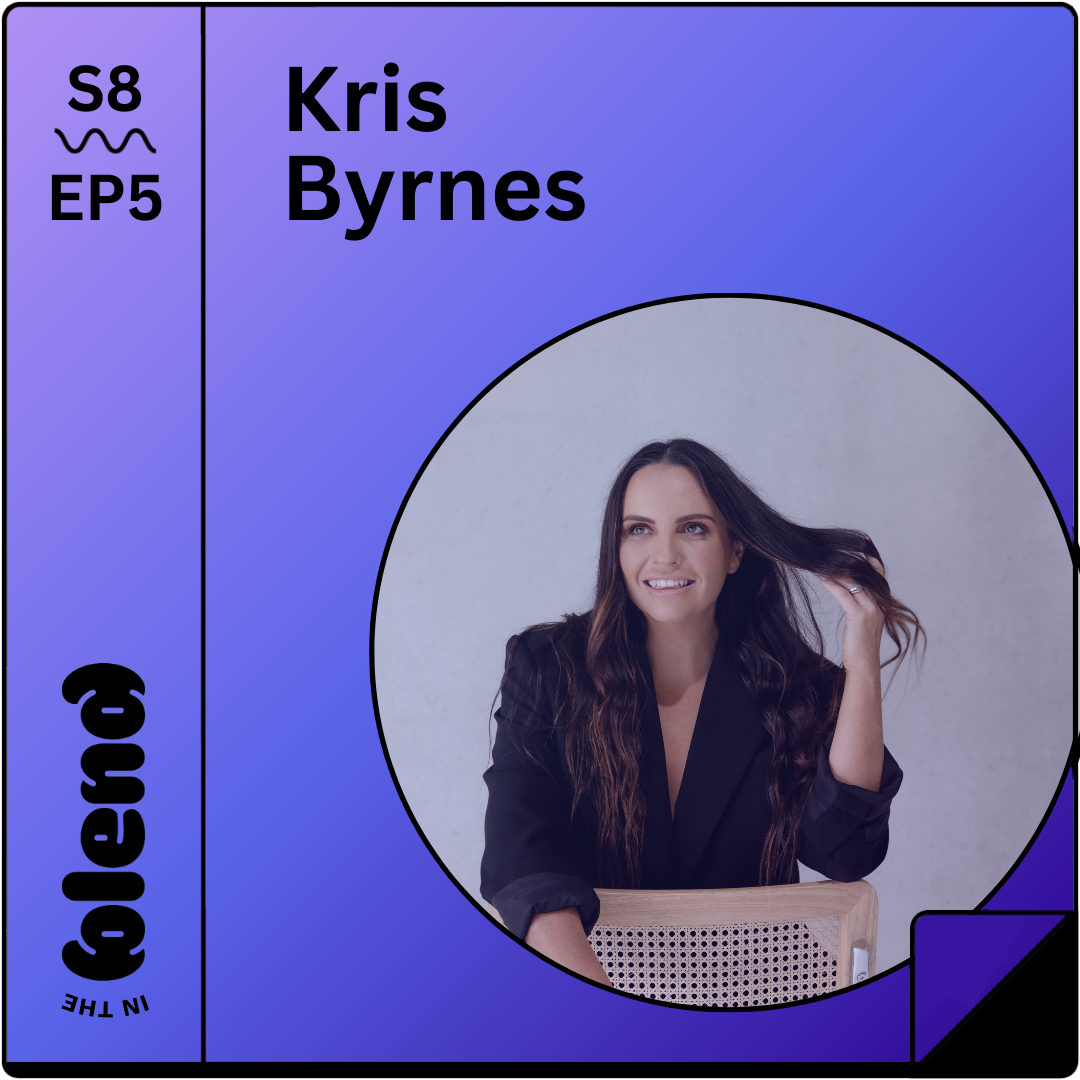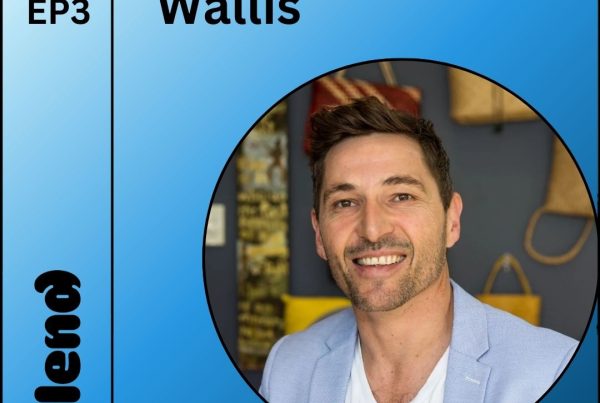
Kris Byrnes, personal development coach, Master NLP practitioner and mum of four (including two stepdaughters), joins the podcast to unpack one of the biggest questions many stepmums quietly ask themselves: Will I ever be enough?
Drawing on her lived experience of growing up in a blended family and stepping into the role of instant mother in her early twenties, Kris shares openly about breaking the “evil stepmother” stereotype, navigating feelings of self-doubt, and the importance of building trust with stepchildren from the ground up.
From practical ways to meet kids where they are, to strategies for protecting your own identity and self-worth, Kris offers heartfelt insights for stepmums at every stage of the journey. This episode is a reminder that feeling “enough” starts within — and that change always begins with you. @insideoutwithkris/
Kris Byrnes:
Normalised kids being kids, don’t take things personally as well. If you’ve got each other’s backs, there’s trust in your partnership, there’s trust in the kids’ exchanges with you, that’s where things can start to build and flow from there.
Laura Jenkins:
In The Blend is a podcast series that helps parents and step-parents navigate life in a blended family. Join me as I speak with experts and guests to get practical advice on how to create a more harmonious blended family life. Having grown up in a blended family and now a decade into raising one of my own, I bring a personal perspective to these conversations and we dive deep into the unique dynamics, logistics and challenges of raising a blended family. From new partners to juggling mixed finances, we will help guide you through it. If you’ve ever wondered, will I ever be enough as a step-mom? You are not alone. Today’s guest, Kris Byrnes, knows that question all too well. She’s lived the complexity of blended family life from both sides, as a child in a blended family, and now as a mom of four, including two stepdaughters. Kris is a personal development coach, master NLP practitioner, and host of the Inside Out with Kris podcast. She’s passionate about breaking the evil stepmother stereotype and helping stepmoms step into their role with authenticity, self-trust, and emotional steadiness. She’s also been on The Morning Show sharing her insights on the identity shifts that come with step parenting. And that’s The Morning Show here in Australia. In our chat, we dive into why stepmoms often feel emotionally unprepared for the new role, how to build trust without overstepping, managing tough conversations, and how to hold on to your own identity while being part of a blended family. So if you’ve ever felt like you’re doing your best but still wondering if it’s enough, this conversation is for you. Welcome, Kris. It is so lovely to have you on the podcast.
Kris Byrnes:
Thank you very much for joining me today. Thank you for having me. I’m really excited to chat with you and it’s lovely to meet you. Oh, you too.
Laura Jenkins:
It sounds like we have a lot in common. So looking forward to getting stuck in here, Kris. So let’s kick off. You grew up in a blended family and you’re now a mum to four kids, which includes two stepdaughters. So how have those experiences shaped the way that you approach step parenting, do you think?
Kris Byrnes:
Yeah, I think it was really normalized for me. And this is something that I didn’t have friends at the time when I was younger. So we mixed in with a blended family when I was about 12 years old, lived with a man and his two children for five years. We bought a family home together. They were my stepbrothers. One was 12 months older, one was I think 18 months younger. And we were really thick as thieves, really, really close as a family unit. Us four kids, I had a brother as well, four years my junior. Unfortunately, that relationship didn’t work out for my mom and that man, fortunately, because he wasn’t the best person. But within that time, there was a lot of heartbreak there for me in terms of losing my family. I didn’t necessarily care about the representation of that stepfather. I had a lot of concepts, I think, of like, oh, what not to do. This is what you don’t do as a step parent, right? But I really grieved my stepbrothers. I really grieved that loss. And that’s a hard thing to navigate when you’re 15, 16. No one’s going through it that you know. There’s no education talking about it. There’s no support other than, oh, you’re just grieving the loss of the family unit. It was more than that. I was grieving the idea of a future that we’d all plan together as brothers and I was the only sister and we’re all best buds. So yeah, I went through that when I was younger. I also now have a disconnected relationship with my biological father, but as a kid I had a every second weekend dad and that doesn’t come from judgment for any other dads doing it like that. He could have done a lot more and had the resources and the tools and the encouragement to do more and chose not to. And that really impacted me as a kid. I knew what I didn’t want more than what I did want. And the whole blend, having a dad that was every second weekend, and mum repartnering, and having stepbrothers, and dad having girlfriends, and dad’s girlfriends having kids. It was, whilst it kind of sucked, it was kind of normalized. So when I met my amazing husband all those years ago, and he had two beautiful daughters, it was a no-brainer. It wasn’t a question of could I, should I, it was, that’s fine with me. And again, This was so frequently normalized, so it really did shape my identity because I feel like if I hadn’t had those experiences, I wouldn’t have had that influence to my decision. As a twenties that went and blended herself with two beautiful little girls and a man and yeah, now we’re this beautifully big blended, very noisy, very chaotic.
Laura Jenkins:
Oh, I love it. I love it. And I really identify with those early childhood experiences, opening up your mind to the decisions that you make in your own life. I know that that was very much the case for me as well growing up in a blended family. So yeah, I get that. And if you don’t mind me asking, Kris, how old were you? You said in your 20s when you met your now husband?
Kris Byrnes:
Early 20s. We knew each other for a little while prior to actually getting together. But I think, gosh, I honestly don’t remember. I think it’s about 23, maybe 24 if I’m honest. Yeah. So that feels like a lifetime ago. It really does.
Laura Jenkins:
And that’s young, that is young to be moving into that role of instant mother. So let’s talk a little bit about that, the evil stepmother myth. And I know this is something that you’re really passionate about breaking, the stereotype of the evil stepmother. So as someone who has at a young age come into a new blended family situation, did you ever feel that evil stepmother vibe? And I’d love to know if you think that whole mentality still exists today.
Kris Byrnes:
Oh, for sure. And look, when I say this, it was not coming from my stepdaughters. My stepdaughters were open arms in love. We did everything together. We’re still very, very close. I’m very lucky that way. We have a very strong foundation from the start because they’re such beautiful kids. And when I came into the role, it was more a societal kind of thing going on where people kind of steered away or thought that I’d done, like, look down on me. Look down on me. Oh no, she can’t make the decision. She can’t do this. She can’t do that. And whilst authority wise and maybe legally, of course, I’m not looking to make medical decisions. I wouldn’t I would never disrespect someone’s parenting experience by not consoling them over medical decisions. But can I go to the chemist and pick up Penadol? Yeah, I can manage that. Just little societal norms that I really noticed people in the schooling system maybe or friends’ parents and things like that. It was kind of like there was just this negative notion playing out. And of course, there was. We’ve got the Cinderella book where you’ve got the evil step-mom, Parent Trap, Cinderella Story is one of my favorites. It Takes Two with Mary-Kate and Ashley Olsen, my favorite childhood movies of an evil step-mom. role. My girls used to watch these shows because I would take them to my childhood favorite shows as you do. I would realize that this is what society thinks of me. This is the role I’m in. I really want to disempower that language and disempower that narrative. I don’t believe it to be true. I had experiences as a child where I had negative women. My dad was dating who gave me really horrible, horrible things to hold on to. I think that narrative as a kid too, but times have changed. Women are different. I think the statistic is over 60% of Australian marriages end in divorce. That is not people that are not married having children. So that’s only based on marriages and that was a few years ago, that study, so I don’t know where it’s at now. But with that being said, recoupling, blending families, repartnering, it is completely normal and to have this notion that the stepmom is this evil, wicked witch coming in and ruining lives and taking houses and doing this and doing that, whilst I’m sure there are some cases where that does happen, it’s not the norm. It’s not the norm and I want to change that. My second oldest stepdaughter, we were having a chat in the car the other day actually and she was sharing with a friend who’s in a split household, pros and cons essentially. And a friend was voicing like, you know, sometimes it’s hard with my stepmom. And she’s like, I just can’t relate to that. And I thought, what a compliment. And I was like, well, that’s really sweet to say, sweetie. Thank you. She’s like, people have said it to me before. And I’m just like, I just don’t really understand what you mean. Like, my stepmom’s great. Like, I’m so comfortable. I’m so safe. I have what I need. She doesn’t, you know, she doesn’t feel like she’s forcing anything ever. And it’s always been that way, I suppose, with us. And we’re all really close, which is nice. But changing that narrative, especially kids. Yes, that exists, but then the duality in that I want to speak to is I want to change the narrative for the stepmoms that might be coming into the role because they’re also holding that unconscious. They’re also letting that pattern play out of, oh, I’m the evil stepmom. I can’t use my voice, I can’t honor my boundaries, I can’t say what I want because I don’t want anyone to think that I’m mean or evil. Build, build, build, brick wall and then work out because you’re not voicing your needs and I’ve seen my clients play out all the time.
Laura Jenkins:
It’s really, really interesting. And I love that you’re passionate about breaking down this myth of the evil stepmother. And as you were talking, I was thinking about how that narrative does play out in so many ways. I’ve had a couple of guests on the podcast before who are also equally passionate and one was actually putting together a play to help break down the stereotype and another wrote a book as well. I think it is important. Another thing as well as the evil stepmother stereotype that I know new stepmums in particular can grapple with is that, am I enough question. And so many stepmums just grapple with that idea of, am I enough? Why do you think this question hits so deeply for stepmums compared to biological parents?
Kris Byrnes:
Because there’s so many little snippets and pieces of evidence to let the self-doubt play out. Because you’re constantly questioning, is that enough? Is that good enough? Am I supposed to do it this way or that way? Especially if you’re coming in a role not having been a mum before. Mums do things different now. I have two babies of my own that I’m raising and I’ve learned a lot. What I’ve done, I probably wouldn’t have changed a lot that I did do. I had a pretty, pretty cool role model. My mum is incredibly nurturing. She is one of these women that just would babysit anyone’s kids, have anyone over, no problem. She’s still that way. My two girls, my stepdaughters have been having sleepovers at my mom’s for many, many years. They still do to this day. School holidays at Nanny Kim’s, which is beautiful. She’s taught me how to operate around children, so I have that nurturing natural side of like, I can tell if a kid needs a nappy change, I can tell if it’s bath time, I know, you know, have something healthy with your dinner. Yes, you’ve got to eat all your meat, like little things like that that other women might not have that education around, right? So that really helped. But it didn’t mean that I wasn’t like, ooh, should I put them to eat that? Or is that going to develop something bad? Or I don’t want to set this to come across the wrong way, like, where do I discipline how do I discipline and this is what my clients are going through right now in the early phases of that intro into step. It’s I don’t know boundaries like right like I know what I think but I don’t want to stir a pot. I don’t want conflict with the repercussions of getting myself in any form of negativity in the household because I’m just trying to find my way and navigate and then you’ve got oh but you did that wrong you should need to do it this way and it’s like you’re just doing your best with the tools you have. really stems from not being enough, however, and I want to bring this to the forefront for your listeners, is not being enough is rooted in your self-worth, right? That’s not being a step-parent or having a co-parenting relationship. If you’re feeling triggered by things within the home that are playing out around not feeling enough, doubting yourself all the time, this is a you thing. This is actually about what’s in yourself and it’s around your lack of self-worth.
Laura Jenkins:
Yeah, absolutely. I over the years have had to do a lot of that work too in building up that armor so that when you feel good about yourself from within, then it does help to kind of push those feelings aside when they do present themselves. Another one is that emotional unpreparedness as well, for want of a better word. And I know you’ve said before that many women who move into the stepmother role are emotionally unprepared. do you think that’s for a similar reason that they perhaps don’t have those inner skills working as well as they could?
Kris Byrnes:
Yeah, look, a lot of people don’t do the inner work until they have to do the inner work, right? And that comes from either, you know, you’ve got repressed trauma that might come up or a big event or experience happens. You sign up to be a step-parent and you’ve got a million different triggers in a million different ways and whether that is from just minor things like a child throwing a tantrum. My son and my daughter, when they fight, I am so triggered by fighting. I just, I don’t know what it is. Well, I do. I think it’s a violent thing. I’m like, no, you don’t get to hit each other. That’s not okay. And, but I get really overwhelmed straight off the bat. I go from here to here. Right. one experience as a mum that I’m going through, let alone ones that I was going through back then, all those years ago. So I think that, yeah, it does come from people not knowing themselves well enough and not having done that. They haven’t had to, and that’s fair. I get it. You don’t have to. But once you start unraveling, you really can’t stop. And once you learn how to be so emotionally in tune and so emotionally intelligent with who you are as a woman, as a stepmother, as a partner to someone with children, once you are confident, convicted in your knowing, I guarantee things move differently in the house. triggers, they dissolve. You are able to neutralize those threats within your body, essentially. There’s this flat line, right, where you’re so neutral, it’s like, cool, this happened, doesn’t bother me. Cool, I’m not going to screenshot this and send it to a girlfriend. I’m built in shame because I had a negative exchange with a child before school, before they went back to their bio parents’ house. I’m just going to neutralize this and because you have those tools.
Laura Jenkins:
Yeah, I love that. I’m also reminded of another guest who said to me that emotions, they come and they go. And I love that. I often think of that. And she said, just know they’re temporary. They come and they’ll always go. And that’s really helped me too, knowing that it’s not permanent, that feeling, whatever it is, it’s going to go. It’s just a temporary feeling. And I found that really helpful too. Yeah, it’s great. So let’s talk about when you met your stepkids for the first time. How did you go about starting to build that trust with them? And then in addition, I’d love to know if you’ve got any tips for stepmoms listening or stepdads, how they can go about fostering that sense of trust with their stepchildren. Yeah. Respecting the boundaries too.
Kris Byrnes:
Of course. Great question and thank you so much for asking. I really love this question. So I was introduced to dad’s partner, I think it was Boxing Day, so it was like right near Christmas or the day after Boxing Day. He was away with the kids in a family thing and I was invited to come up and meet everyone. Met them then in that capacity and what I can recall is I remember my oldest, she didn’t like putting sunscreen on. It was a whole thing apparently all week and refused to put it on. tears, all the things. And I remember I said, you do me, you can do me and then I’ll do you, is that fair? And I said, you can put as much on as you want and I made a big joke out of it. There was very no pressure and you can just see that immediate exchange, that bond was exchanged where she just, she painted me white basically and I was covered. brain and she was absolutely losing it laughing and it was a really cute way to sort of meet her energy, give her a giggle and I guess that’s what I invite women to do. It’s like stop trying to expect a child. This is a child, right? These are children. You can’t force anything right now. That’s not up to you. Meet them in their needs. Meet them in their laughter. Meet them in their playfulness. Meet them in their joy. Do things that make them happy. Take them out of the environment of like, let’s sit down and have dinner together and sit still and get to know dad’s new girlfriend. That’s never going to work. Sorry. Take them to a playground. Take them to a trampoline park, bowling, whatever, something awesome. and do it as a family and then maybe go off in pairs or something and then change back over and go off in the other pairs. Practice patience. Patience is huge. They’re babies. This is all new. adult, act like it. Don’t act like the child that has demands and wants and I just want them to feel like this and I just want them to feel like that. Great, you can want that all you want, but what’s important right now is that they feel safe with you and focused on building. This is your launch pad, brick by brick to build the wall of trust. It’s going to take time. I have really imprinted to my girls that I’ve got them. I’ve got you. You need me, I’m there. There’s a problem, let’s solve it together. And I’ve always operated this way. And I think that’s been the foundation of why we’re so strong and why we are so connected. And I’m really proud of that. And I think that they’ve had a really good experience having a stepmother, I hope. They might tell you different some days, but you never know. We work as a team and that’s important too. The other thing I’d recommend would definitely be you and dad, this is for the stepmoms, and dad. If you’re bringing a woman into your world and your children’s lives, you have to operate on the same frequency. You have to be the team. If you don’t like it, even if you don’t agree, right? And I do this in all of the parenting experience. My husband and I have each other’s back no matter what. That’s the most important piece. It’s what’s the foundation, right? And normalize kids being kids. Don’t take things personally as well. If you’ve got each other’s backs, there’s trust in your partnership, there’s trust in the kids’ exchanges with you, that’s where things can start to build and flow from there.
Laura Jenkins:
Yeah, I so agree. You have to. You have to be that united front. And I love what you said about meeting kids where they are as well and just remembering they are kids. They don’t necessarily want to have that adult type conversation at the table like you would potentially do with an adult you were meeting for the first time.
Kris Byrnes:
Yeah, and most expectations are going to change straight away. Like, but I took them to the trampoline park, they should like me by now. No, darling, it’s probably going to take a little bit more time than that. That’s just step one. I went with you. That was step one, you know. I think really just honouring children and honouring their security and where they’re at. Stop for days. Later you can put some energy into honoring yourself, honoring your boundaries, speaking your truth, all of that comes but in that initial meeting stage to fully wrap around and answer that question in that initial meeting stage, honor the kids first.
Laura Jenkins:
Love it. So let’s talk about your own identity, your sense of self, Kris. And I know you’ve had a very busy season in your 20s and now into your 30s with two stepkids and then adding two of your own to the mix. How do you go about nurturing your own identity and your own well-being through the busyness just so you don’t lose yourself in those family dynamics?
Kris Byrnes:
Yeah, look, it took a long time to get to this point, but I will say I’m selfish and I’m unafraid to say it. In the past, I was really terrified of that language. I thought I had to wear this martyrdom as a badge of honor. I thought motherhood was my badge and I had to wave it around and show everyone, oh, this is what I do every day and this is what I do for the family. It’s nothing special. Right? Yeah, you’re special. All of us are, but I’m not anything special. I needed to remember that for a minute because it’s like everyone’s in it. Everyone’s in a season. Everyone’s going through experiences and events that are shaping their lives and future. I’m not the only one in this right now. And I think for a while there, I lost myself in that thought process and I was a victim to my thoughts. I was a victim to my patterns. So in order for me to get to where I am, I had to start acting really selfish. I had to start saying no. I had to set boundaries with friends. I had to put the gym first and ask for support at home. I had to ask my kids to step it up. It’s a big house. I’m one woman. There’s a lot of washing. You need to give me a hand. This is your contribution to the home. There’s things that needed to happen, family meetings and things that needed to be honored so that I can be happy and fulfilled and have time to do things like this, spread my message and fulfill my mission. My favorite quote is it’s my first time on a two. It’s my first time raising children too. I’m not going to be perfect at it, but I am going to enjoy my life and I’m not going to make so many sacrifices that I’m resentful to my family because then I think you know what happens. Then once we’re all that projects everywhere else and no one’s happy.
Laura Jenkins:
Yes, totally. And so as a step-mom and also a coach, what boundaries then or practices are non-negotiable for you in maintaining that healthy family environment? Are there any big ones that you haven’t covered?
Kris Byrnes:
Yeah, look, I think that for me, it’s taking care of my health because my health, it’s in all areas. If I’m not going to the gym, I’m probably also not eating appropriately. If I’m not eating appropriately, then I’m not behaving in the way that I’m proud of and that feels true to me and to me honoring my high. That’s really important. It’s within a family dynamic. It’s phones down. There’s times in our house where we have no screen time. My six-year-old son has just found UNO, so we’ve been all the way in on UNO at the moment. It’s going for walks and family time where we get out in the car and go do something all together, go out for lunch, things like that. My girls are at a beautiful age where they love going out for dinner, so that’s really nice to be able to take them when we can and just spend that quality time with them, the little ones, and keeping the little ones at home where we can and vice versa. and not just solely communication, it’s vulnerability in communication. A mission slip in my home is I can hear you when you speak, that’s communicating, but if you’re not communicating with vulnerability, I can’t understand what you’re saying. There’s nothing there for me. You need to speak truthfully, honestly and openly and I’ll hold space. And language is a big one in our house, the way that we speak, the way we deliver things, being aware of that, talking through. There’s no excuse not to talk through something when you’re feeling something big and it explodes and then, you know, whip that one out of the rug in my home. So yeah, there’s things like that I guess we do. There’s nothing that’s like on the fridge of the list, but things that work.
Laura Jenkins:
No, I like it. And so coming back to the communication, are there any other strategies there that come to mind around how you either speak to your children or requests in the way that they speak?
Kris Byrnes:
Yeah. I’m just this way as a parent. I was raised this way and it’s projected onto me and imprinted my belief system, but I’ll always support you through the truth. That’s a big one. I don’t, I’m always going to find out. So here’s your opportunity, here’s your window of opportunity. And that seems to be the thing that, you know, honors our family as well as like, I can be disappointed and I can feel my feelings still, but I’m not going to, there’s not going to be the same repercussions if there’s honesty. Oh my God, he hides remotes in areas of the house so that when we leave the room he can turn on YouTube to watch the shows he’s not allowed to watch, right? Like he is quick. And it’s like, I can’t lock the box now where the remotes go in the lock box and I have to lock it because I do not know. It’s just too easy to access. Yeah.
Laura Jenkins:
You know, I think that’s… Whatever works.
Kris Byrnes:
Yeah, absolutely. Yeah. And that is… Sorry, just one more thing is… and I can hold space. So the permission slip to a child, and I think every single parent needs to familiarize themselves with this, is give them permission not to tell you what’s wrong. If they’re asking for it, I don’t want to talk, I just need a hug, or I just need you to hold space for me. let them and honor that all the way through. You can’t ask questions to that. Let them come to you with it. And it’s really beautiful in my house that I really have noticed with especially my younger two, how interesting it is they’re saying it to me now. Mommy, do you need me to hold space for that? Or do you just need…
Laura Jenkins:
Oh, how gorgeous. I love it. So, are there any other personal non-negotiables, Kris? And it sounds like you’ve got a pretty good handle of all the things needed to keep everything humming. Is there anything else that you would add?
Kris Byrnes:
I would just add the word emotion linguistically speaking so I have a master’s in linguistics so what that actually means is energy in motion. So you spoke to that before where the emotions don’t stay. No they don’t but we can choose to hold them and that is a choice. That is something that you will either honor or dishonor. Now what I want to speak to is the negative emotions so say anger. Let’s let that play out in all kids. You can choose for your child to hold on to that by not exploring options for them to release it in a really healthy way. And that can look like jumping in the pool. It’s too cold now, but in summer, we will jump in the pool and scream underwater. We will take some big, deep breaths. My five-year-old daughter last week only came to me when I was so frustrated. I was really tapped out that day. And I didn’t lose it, but I was like gritting my teeth. And she said, Mommy, put the anger into your hands and push it out of your body. We don’t hold anger inside. She’s amazing. Wow. I know. So just those little tactics of emotion, we want to move energy, move through it, walk, get outside, run, play footy out the back with the kid, play touch, tips, sorry, not touch, buddy, he’ll get the twister box out. Just anything to move through energy and your thought powers will shift in a couple of minutes.
Laura Jenkins:
Such good advice. We live right opposite a park and often getting the kids and the dog and everyone out to the park for that very reason too. So it helps, movement. One of those simple foundational things that just makes such a difference. So we are just about at time here, Kris. If you could leave stepmums listening with one more piece of advice to help them feel more enough in their role, what would it be?
Kris Byrnes:
Nothing changes if nothing changes. So if you’re feeling sad, lost, disconnected, dysregulated, uncertain, it’s time to take full radical responsibility of that. That’s on you now. You have the tools. You’ve listened to this episode. You have more information than you did 20 minutes ago. So what you do from now counts. Just really honor yourself by taking that level of accountability and saying, how long am I willing to sit back and let life play out for me? Can I stand up and take that responsibility now and make a decision to change my patterns, change my behaviors? And notice what happens when you change you. It doesn’t need to be that the kids need to be different or your husband needs to say more or the ex needs to stop contacting or whatever the thing is that’s playing out. It needs to be you change you. And if you’re not happy, then change.
Laura Jenkins:
What a fabulous spot to end. Kris, thank you so much for joining me today and speaking so openly as well about the realities of step parenting, the good, the tricky and really everything in between. I know so many listeners will be breathing a little easier after listening to all of your words and realizing that they’re not alone in all of the feelings, all the things that they’re going through. So yeah, thank you so much. I know people will get a lot out of it.
Kris Byrnes:
Well, thank you so much for having me, Laura. It’s been really nice to speak with you and it’s nice to speak to someone that understands and gets it and sees it. Yeah, it’s an incredible honor to share my story and I hope this resonates with someone.
Laura Jenkins:
Wonderful. Well, Kris, we will be sure to put a link to your website and contacts on the show notes so listeners can get in touch. And once again, thank you so much for being on the show. Thanks, Laura. I hope you enjoyed my chat with Kris. So many gems of wisdom to take away. And I particularly liked her parting piece of advice, that change begins with you. If this episode resonated, please follow In The Blend wherever you listen to your podcasts and share it with a step-mom or blended family friend who might need to hear this message. The more we share these conversations, the more we can rewrite that narrative for step-parents everywhere. Thanks again for tuning in. and I’ll see you next time.
Laura Jenkins:
Thanks for listening to the In The Blend podcast. The show notes for this episode are available at intheblend.com.au. And if you like what you heard, be sure to subscribe and please rate and review in your podcasting app. You can also follow me on Facebook, Instagram, and LinkedIn.





